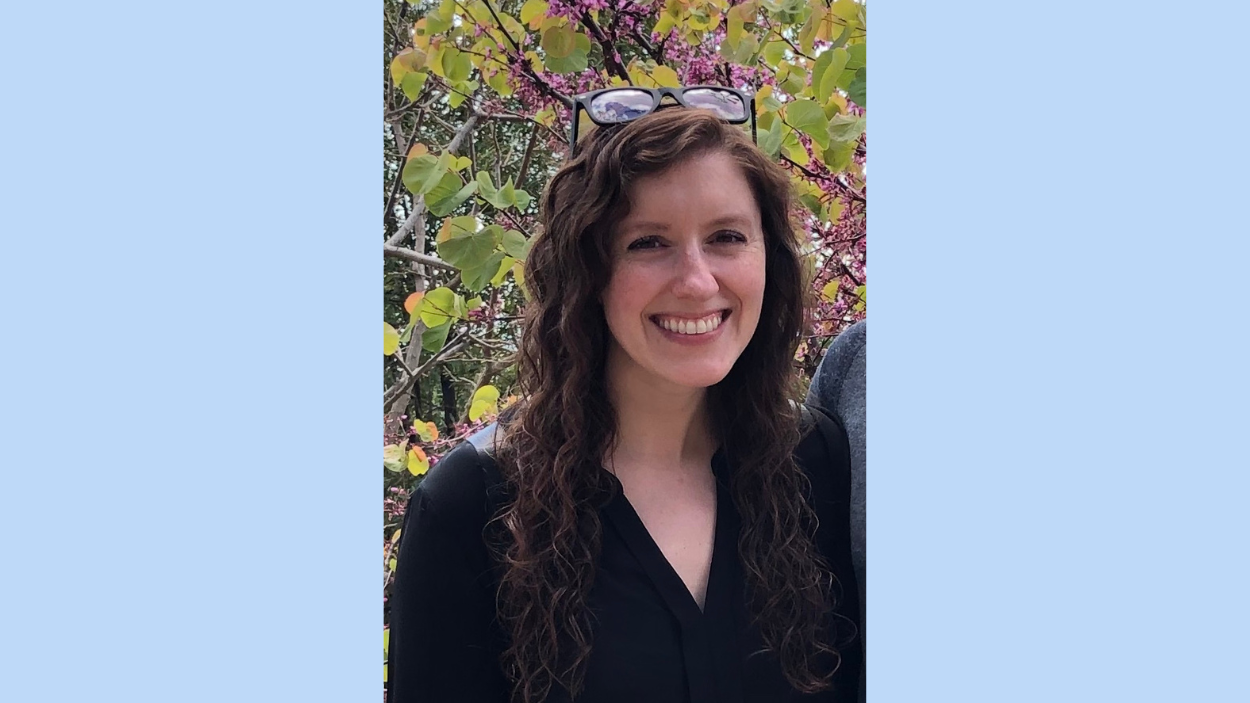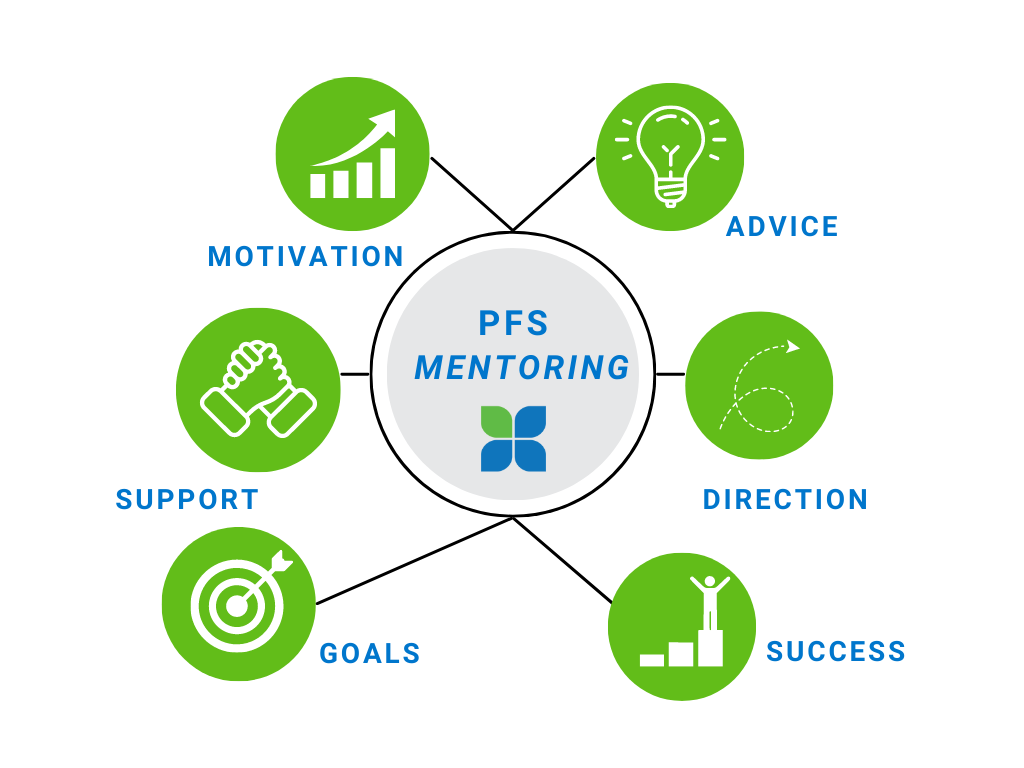Smuckers Volunteer Helps Craft Sweet Potato Waffle Mix
Valerie Diehl’s focus as a product developer on the research and development team these days is on peanut butter, specifically on the brand Jif. In the twelve years since she joined Smuckers right out of college, she has worked on consumer brands like Uncrustables, Crisco and Eagle Milk and in the natural foods business on beverages, grains, and snacks. This varied experience has always kept things interesting for her at work and is also why she has been a great asset to PFS as a volunteer. Valerie joined her first PFS project with a lemonade producer in 2022 and is currently engaged on another with our client Kokari Coconuts in Nigeria.
As their name suggests, Kokari Coconuts processes coconuts to serve the food, cosmetic and pharmaceutical markets in Nigeria and across Africa. Kokari grows their own coconuts for their processing needs and cultivates sweet potatoes as a cover crop during the coconut off-season. The sweet potatoes are processed into flour for business-to-business sales. However, sweet potato flour is not considered a staple food or typically used as a swallow* in Nigeria. Kokari was looking into additional uses for the flour and considering a sweet potato waffle mix. They reached out to PFS to get expert advice on the best way to develop this waffle mix with desirable sensory characteristics. It was also important to Kokari to have a recipe with a simple ingredient list that is also gluten-free.
Though she had not worked on a product like this before, Valerie has been doing a lot of research and tapping into experience from her days in natural foods where she worked on sweet potato juice and on gluten-free products. She has helped Kokari come up with starting formulas for a waffle mix; proposing a number of ingredient combinations to achieve the perfect sweet potato waffle while keeping the amount of ingredients the consumer will have to add to a minimum. The Kokari team has been very open to recommendations and has run trials which have produced a lovely sweet potato waffle. The project team is currently working on how to improve the appearance, as the sweet potato flour mix browns after preparation. This project has been a wonderful experience for all. “Kokari Coconuts have been phenomenal to work with,” shares Valerie. “We have calls every two weeks to discuss the project and share updates via email in between calls. They have welcomed my suggestions and are willing to try different things, even when I’m not sure that it will work. It’s also been fun interacting with them and learning about their products. It has been a really rewarding experience.”
For Kokari, Valerie’s insights have been a game changer. “Valerie’s expertise has put us on the rightpath and we can’t wait to see what the final outcome will be.” -Kokari Foods
*Swallows are complementary foods that are made from popular staple foods like cassava, wheat, plantain, cocoyam in Nigeria, and are typically served with soups.
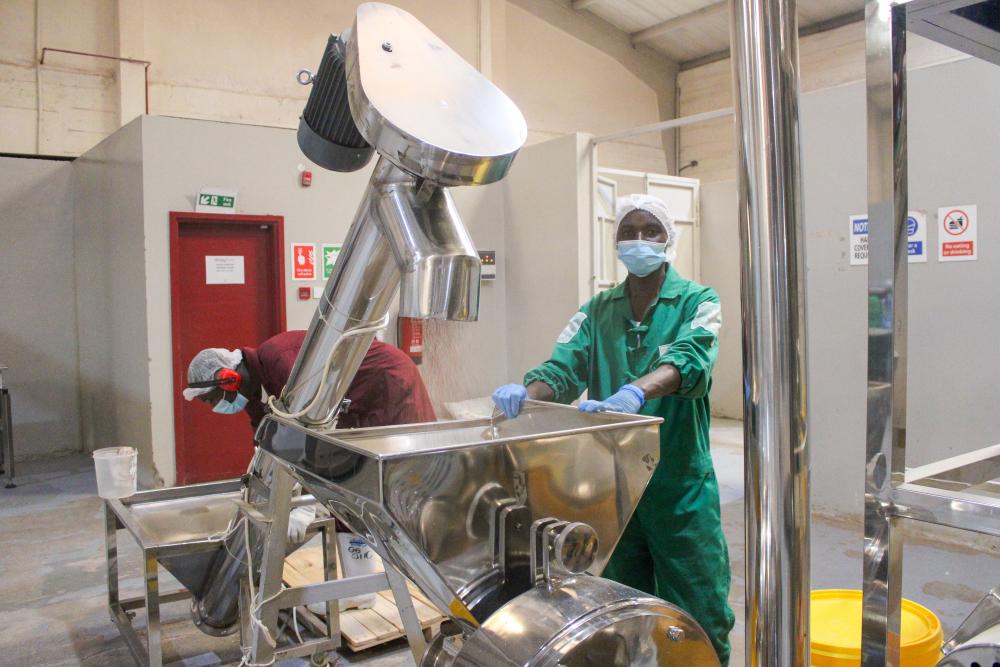
Alliance For Inclusive And Nutritious Food Processing Comes to an End
Building on previous successful collaboration on food processing assistance programs, in 2018 USAID, TechnoServe, and Partners in Food Solutions (PFS) launched the Alliance for Inclusive and Nutritious Food Processing (AINFP) to help create a more competitive African food processing sector. The AINFP program was established under the U.S. Government’s Feed the Future initiative and supported food processing companies in five African countries, namely; Ethiopia, Kenya, Malawi, Tanzania, and Zambia. The partnership sought to improve inclusive and sustainable agriculture-led economic growth, support a well-nourished population, especially among women and children, and strengthen resilience among people and systems by increasing the capacity and inclusivity of African food processors.
We are pleased to share that the program has come to a successful end this year, with many success stories and learnings. Under the AINFP model, locally-based TechnoServe staff provided on-the-ground support and collaborated with PFS volunteers, who applied their knowledge and experience to help the processors address their unique manufacturing and business challenges. Over the six year period, 652 volunteers contributed their time and expertise to support over 200 clients in areas such as good manufacturing practices, quality control systems, improved shelf life, new and improved product development as well as business plans and marketing strategies. Reports and outcomes will be shared over the course of the year. Stay updated with AINFP on LinkedIn and hear from clients themselves as they share the tangible impact made on their operations.
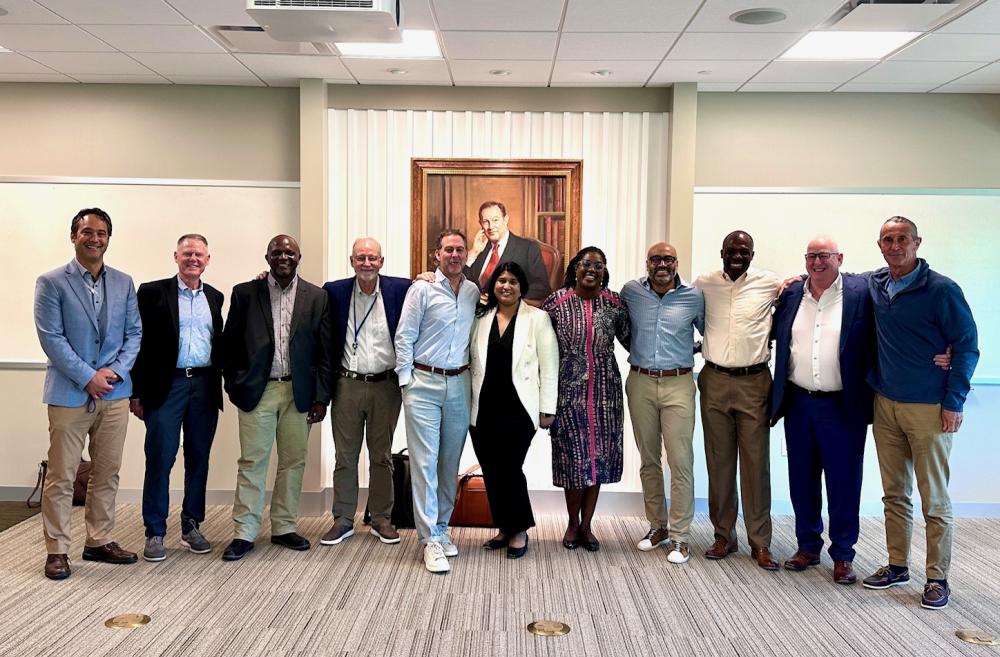
PFS Forward!
The last few weeks have been a whirlwind of activities at the PFS headquarters in Minnesota! We held our board meeting to close the fiscal year, which also marked the end of our three-year strategy of going deeper in support of our clients. We are thrilled to share some of our accomplishments.
- Increased average duration of client relationship and number of services delivered
- Diversified and increased ways of engaging our volunteers
- Expanded our high-potential client base to over 200 food companies across 9 markets
- Helped high-potential clients increase their revenue growth
- Successfully completed the Alliance for Inclusive and Nutritious Food Processing (AINFP) program, a six-year partnership with USAID and TechnoServe
- Created new types of services for our clients to more holistically address their needs
- Connected clients through networking dinners and executive leadership sessions to foster relationships between processors in the local food markets
We are truly grateful for the generosity of our corporate partners and donors, whose support has helped us expand our program and reach more beneficiaries than ever before. Our prudent financial management has also ensured that we maintain a healthy balance sheet, positioning us strongly for the coming year.
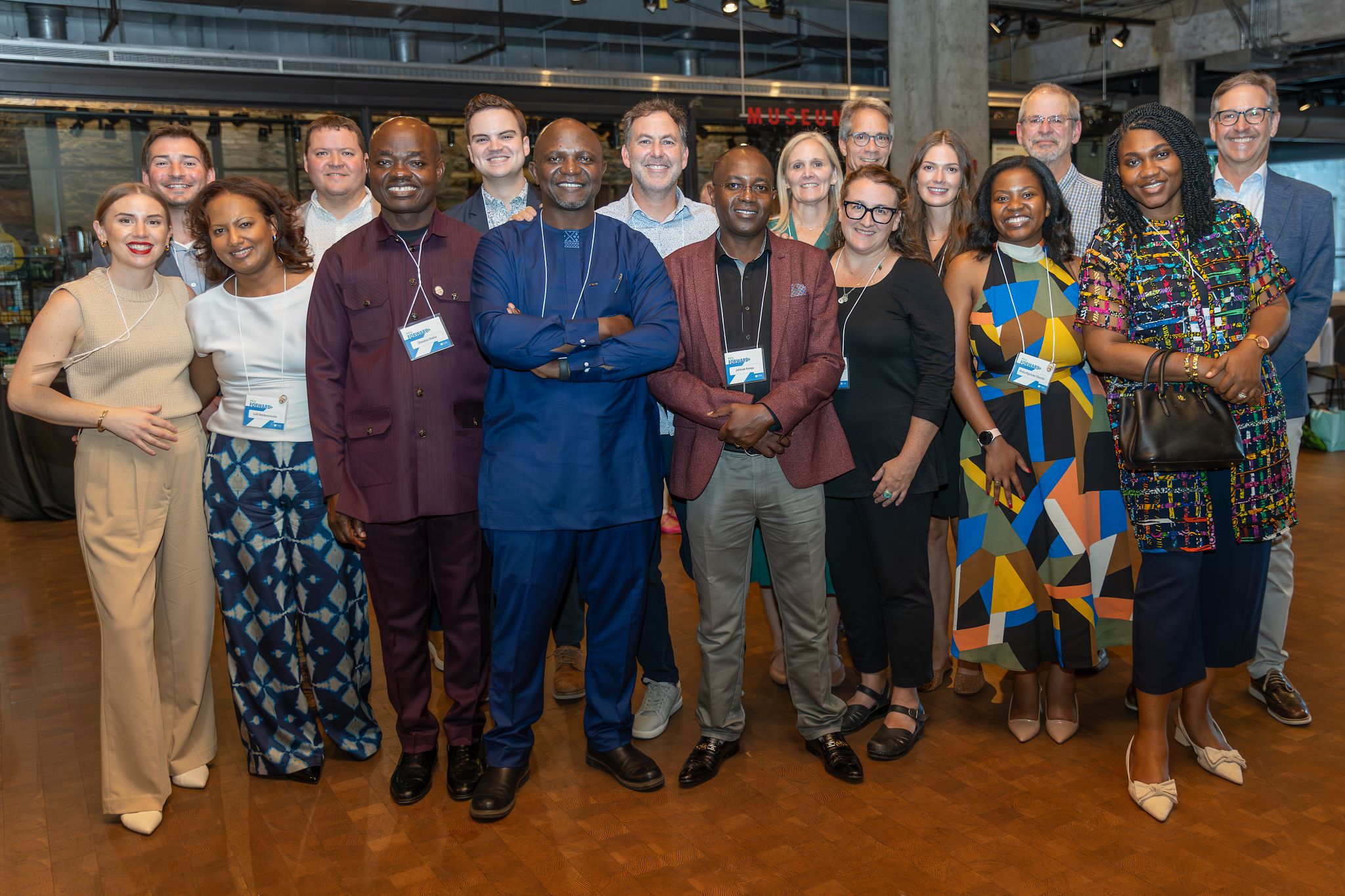
Another highlight was a much-anticipated visit from incoming CEO Mandla Nkomo, who engaged with staff, volunteers, and other leaders. He shared some of his insights and what he looks forward to in the upcoming year.
Looking Ahead
As we reflect on the successes of the past year, we are filled with optimism for the future. Our board meeting reinforced the strength of our organization and the dedication of everyone involved. We extend our heartfelt gratitude to our outgoing CEO Jeff Dykstra, board of directors, corporate partners, staff, volunteers and donors for their unwavering support. With clear goals and a shared vision, we are poised to achieve even greater heights in the coming year.
Seeding The Future Foundation support key to success of PFS Kenya program
During his 21-year career with General Mills, Bernhard van Lengerich saw the power of philanthropy up close through the company’s foundation as well as many of its volunteer programs. He also had the opportunity to travel to East Africa with Partners in Food Solutions (PFS), a Minnesota-based and General Mills-founded non-profit organization which provides expertise to African food businesses primarily from volunteer employees of world-class food companies. Bernhard went on this trip to learn more about the food value chain and to see up close the work Partners in Food Solutions was doing and how it was helping to improve global food security. He returned to the US motivated.
“The discrepancy in food access and food supply between this region and western geographies or the ‘global north’ are staggering. Within less than 10 hours you can travel from a world where hundreds of millions of people are starving, struggling to find food, are undernourished and stunted, to a world where food is in abundance. Research data shows that in the U.S. alone, over 40% of all food is wasted or lost - equivalent to over $400 billion. Over 80% of the population is metabolically unhealthy and more than two-thirds are either obese or overweight,” van Lengerich said.
“My experiences in Africa along with my work experience at General Mills - a company with philanthropy at its soul - shaped the fundamental beliefs that led me to setting up Seeding The Future Foundation. These fundamentals still guide the foundation today: 1. Everyone must have equitable access to safe and nutritious food that is affordable, attractive, and trusted; 2. Chronic hunger is unacceptable, and 3. Game-changing ideas always start small in the lab but can have a transformative impact at scale when nurtured and enabled to grow.”
The van Lengerich’s and their Seeding the Future Foundation, have supported Partners in Food Solutions’ program in East Africa for a long time. An initial philanthropic investment of $500,000 led to a further unrestricted gift of $1.1 million in 2019 to PFS’ Kenya program. This has allowed Partners in Food Solutions to work with almost 40 food companies, 44% of which are female-owned or managed. These companies employ over 3,600 people and have a supplier base of over 113,000 farmers.
Of particular importance to van Lengerich is Partners in Food Solutions’ apprenticeship program, which allows graduates with food science degrees to learn the trade up close and provide qualified support to companies who need to staff their labs and other areas of operations. van Lengerich, who himself completed two apprenticeships early in his career – one as a baker and one as a pastry chef – said he wanted Seeding The Future Foundation to help talented students be able to support the growth of African food companies. He sees the program as a bridge for students coming out of academia to their professional lives.
“We’re happy and honored to be able to support this program. It’s really great to see how bright students get educated and ready to go into the work environment, and then contribute to a better food supply overall. That’s why it’s a joy working with Partners in Food Solutions,” van Lengerich said.
“For every person we support, there is a contribution that the person is making to safer and higher quality food, which will help to improve the value chain in Kenya. While the program directly benefits students who are employed by food companies, the indirect impact on a safer and more nutritious food supply and society is many times bigger.”
Since June 2019, PFS has placed 34 apprentices in food production businesses. Of those who completed the one-year training, 38% have gotten jobs with that company, while 41% are employed elsewhere. More yet go on to further their education. The goal, said Magdalene Mbaga, director of service innovation and impact at PFS, “is to get them their first job out of college in the food industry, and keep them there.”
“There’s not enough support for food companies,” Mbaga said. “There’s a lot of donor attention around farmers, and there’s really no one else out there that exclusively focuses on the food companies that are going to take the farmers’ harvest, clean it better, and formulate it into healthy, nutritious foods in a way that it can be safely kept on the shelves for longer.”
Mbaga said that Partners in Food Solutions typically works with food businesses in Kenya that are ready to take their companies to the next level, but don’t have access to needed expertise in the market. Outside of the apprenticeship program, Seeding The Future Foundation’s gift has helped support 90 projects, as well as 66 mentorships in Kenya. It has also helped support clients with financing, consultations on equipment and finance, and food processing certification.
“What makes us different - and the only way that we can do this - is by hiring our own staff who are food scientists from Kenya, educated in Kenya, who understand the entire food processing system there, and can develop these long-term relationships with our clients and understand their needs,” Mbaga said. “Private donors like Bernhard and the van Lengerich’s Seeding The Future foundation make this possible. Without their help, we would be saying goodbye to clients and leaving them without the support that they need to grow and to solve problems. We are so grateful for partners like Seeding The Future Foundation.”
Expanding Excellence Through Mentorships
Diana Mboya is a PFS apprentice who serves as a quality assurance officer with Abysinia Dairy in Kenya. Diana joined the company in 2023, after graduating with a BSc in Food Science and Technology from the University of Nairobi. As part of her apprenticeship program, Diana was paired with a mentor, Xin Stannard, a co-pack quality engineer with Ardent Mills. Xin’s approach to the mentorship was to get to know her mentee well enough to understand her needs and challenges and leverage her strengths and expertise to help her grow.
This month, their year-long mentorship draws to a close and Diana has some great feedback to share. "I want to give a huge thanks to PFS for the opportunity granted to me and especially the mentorship program. It has been invaluable for me." Diana's relationship with her mentor has been characterized by understanding, support and a shared commitment to growth. She shares, "I am pleased with the way the mentoring scheme has progressed and I feel that I have benefited greatly from being able to discuss not only work-related topics, but general life issues.”
Xin provided guidance to Diana on the relevant professional skills she could build. With her mentor's advice, Diana delved into a series of online courses, obtaining certifications in ISO 45001:2018, ISO 9001:2015, ISO 14001:2015, Food Safety and HACCP level 2 (sponsored by PFS). She is currently working on an ISO 17025:2017 certification. Xin also took the extra step of investing in Diana’s professional development by sponsoring an online training course on Infographics and Data Visuals.
Diana acknowledges the personal touch in her mentorship, sharing, "I feel so comfortable talking to my mentor; it's amazing. I couldn’t be happier with the quality of mentorship I have received and with the way that this was all organized centrally by PFS." Beyond certifications, Xin has helped Diana to refine her resume and has played a pivotal role in shaping her perspective on career and success. Reflecting on the mentorship's profound impact, "My mentor has been a game-changer for me. Thank you so much PFS."
Diana's and Xin’s journey exemplifies the essence of a successful PFS mentorship – a collaborative effort of two parties learning from each other and growing together. As we celebrate stories like hers, we are reminded of the true power and impact of mentorship.
